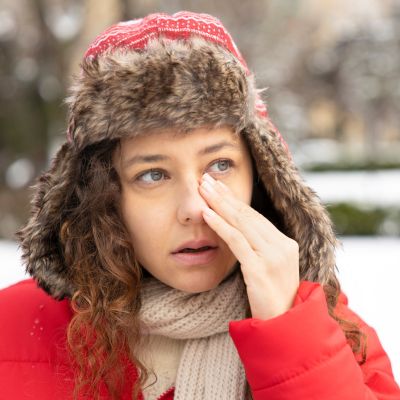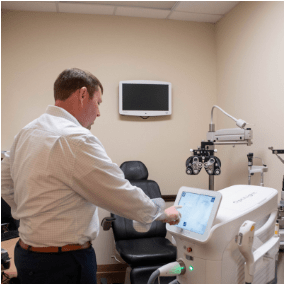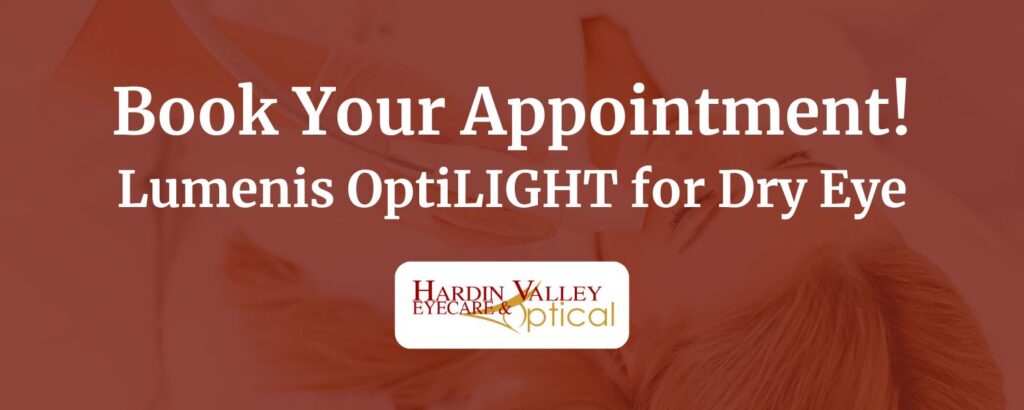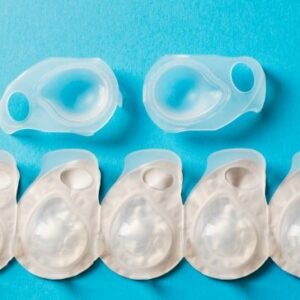Dry eyes in winter are a common concern in regions like East Tennessee where seasonal changes bring cooler temperatures and drier air. Dryness occurs when eyes don’t produce enough tears or when tears evaporate too quickly, leading to discomfort and irritation. As fall transitions to winter in the Knoxville area, proper eye care is crucial for ensuring eye comfort.

East Tennessee’s seasons influence dry eye symptoms. Cooler fall temperatures and winter’s cold, dry air can exacerbate dryness. Factors like indoor heating, wind exposure, and screen time also contribute to discomfort. Dry eye management and treatment include hydration, protective eyewear, or intense pulsed light therapy for the most long-term relief.
Understanding Dry Eyes
Dry eye syndrome is a common eye condition characterized by insufficient lubrication and moisture on the eye’s surface. It occurs when the eyes don’t produce enough tears or when the tears evaporate too quickly. This disruption in the tear film can lead to discomfort and potential damage to the eye’s surface, which consists of fatty oils, aqueous fluid, and mucus.
Symptoms of dry eyes include:
- Stinging
- Burning
- A scratchy sensation
- Redness
- Sensitivity to light
- Blurred vision
Oddly, watery eyes can also be a symptom as the body attempts to compensate for the dryness.
General causes of dry eyes include:
- Aging
- Certain medical conditions
- Medications such as antihistamines and antidepressants
Prolonged screen time and hormonal changes, particularly in post-menopausal women, can contribute to dry eye syndrome. Additionally, environmental factors like low humidity and exposure to wind can exacerbate symptoms, which is why dry eyes in winter occur.
Dry Eyes in Winter
Dry eyes in winter are a common occurrence due to a combination of environmental factors and physiological responses. The cold winter air typically contains less moisture than warmer air, leading to increased evaporation of tears from the eye’s surface. This rapid evaporation disrupts the delicate balance of the tear film, which is essential for maintaining eye comfort and health.
Winter conditions affect tear production in several ways. The cold air can cause there to be less oil within tears. This reduction in oil production leads to faster tear evaporation and increased dryness.
Indoor heating, while providing warmth, significantly impacts eye moisture. Heated indoor air is often extremely dry, further contributing to the evaporation of tears. This creates an environment where the eyes struggle to maintain adequate moisture levels, leading to discomfort and irritation.
The prevalence of dry eyes increases noticeably during winter months. Many people who may not experience dry eye symptoms at other times of the year find themselves affected during this season.
This is due to:
- Outdoor cold
- Indoor heating
- Increased screen time during indoor months
All of this contributes to the perfect storm for dry eye syndrome.
Other Seasonal Factors Contributing to Dry Eyes
In addition to cold temperatures and indoor heating, other seasonal factors contribute to dry eyes in winter. Increased exposure to wind can accelerate tear evaporation and irritate the eye’s surface. Winter air also often contains higher levels of debris and pollutants, which can further irritate the eyes.
The prevalence of colds and flu during winter months can lead to congestion and inflammation that affect tear production and drainage. Seasonal changes in diet, such as increased consumption of dehydrating beverages like alcohol and caffeine, can also impact overall hydration and contribute to dry eye discomfort.
Dry Eye Prevention and Management

Preventing and managing dry eyes in winter requires a multifaceted approach. Lifestyle adjustments are helpful, such as reducing your exposure to harsh winds and avoiding direct heat sources that can worsen dryness.
Maintaining proper hydration is essential since drinking plenty of water helps support overall eye health and tear production. A diet rich in omega-3 fatty acids can also contribute to better tear quality.
Using a humidifier in indoor spaces helps combat the drying effects of heating systems, maintaining moisture in the air and reducing tear evaporation. Protective eyewear, particularly wraparound sunglasses, shields eyes from cold winds and UV rays when outdoors.
Regular blinking, especially during screen use, helps distribute tears across the eye surface. Over-the-counter artificial tears can provide relief for mild dry eye symptoms.
For those experiencing persistent dry eyes in East Tennessee this winter, book an appointment with Dr. Travis Thompson or Dr. Catherine Abbott. We can recommend additional treatments to provide relief from dry eye symptoms.
Intense Pulsed Light (IPL) Treatment
Out of all the treatment options for dry eyes in winter, intense pulsed light (IPL) treatment is the best option for long-term relief.
IPL is a non-invasive therapy that uses broad-spectrum light to target specific tissues. For dry eye treatment, IPL technology employs pulses of light to stimulate the meibomian glands, which produce the oily layer of tears. This stimulation helps improve the quality and quantity of oil in tears, reducing evaporation and enhancing tear film stability.
IPL is considered a leading treatment option for dry eye syndrome due to its effectiveness in addressing the root cause of many dry eye cases: meibomian gland dysfunction.
It can:
- Reduce inflammation
- Improve blood flow to the eyelids
- Decrease bacterial load on the eyelids
Additionally, IPL offers long-lasting results with minimal discomfort and downtime, making it an excellent option for patients seeking relief from chronic dry eye symptoms. At Hardin Valley Eyecare and Optical, we offer Intense Pulsed Light (IPL) treatment for dry eye with the LUMENIS IPL device. The LUMENIS IPL device is the only FDA-approved equipment for dry eye treatment.
Fall weather and winter’s dry air worsen dry eye symptoms in East Tennessee. This is compounded by indoor heating and increased screen time. Combat discomfort with proper hydration, diet modifications, and protective eyewear. For persistent issues, advanced treatments like intense pulsed light therapy offer effective, long-lasting relief.
Hardin Valley Eyecare & Optical has been serving Knoxville since 2009. Located at 10904 Spring Bluff Way, you can schedule an appointment online or call us at (865) 888-0892.






